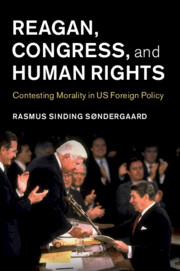Book contents
- Reagan, Congress, and Human Rights
- Human Rights in History
- Reagan, Congress, and Human Rights
- Copyright page
- Contents
- Figures
- Acknowledgments
- Abbreviations
- Introduction
- 1 After the Breakthrough
- 2 The Reagan Turnaround on Human Rights
- 3 The Congressional Human Rights Caucus and the Limits of Bipartisanship
- 4 The Right to Leave
- 5 “A Universal Human Rights Issue”
- 6 Two Tales of Human Rights
- Conclusion
- Bibliography
- Index
Conclusion
Published online by Cambridge University Press: 27 March 2020
- Reagan, Congress, and Human Rights
- Human Rights in History
- Reagan, Congress, and Human Rights
- Copyright page
- Contents
- Figures
- Acknowledgments
- Abbreviations
- Introduction
- 1 After the Breakthrough
- 2 The Reagan Turnaround on Human Rights
- 3 The Congressional Human Rights Caucus and the Limits of Bipartisanship
- 4 The Right to Leave
- 5 “A Universal Human Rights Issue”
- 6 Two Tales of Human Rights
- Conclusion
- Bibliography
- Index
Summary
The contestation among members of Congress and the Reagan administration over the role of human rights concerns in US foreign policy was the defining factor shaping American attention to human rights in the 1980s. Having been at the forefront of the breakthrough of human rights concerns in the United States the 1970s, members of Congress played a vital role in the persistence of these during the Reagan era. Ronald Reagan came into office determined to break with Jimmy Carter’s human rights-based foreign policy, but within a year rejection had made way for reform. Members of Congress were essential to this turnaround in Reagan’s approach to human rights, as they pressured the administration to reconsider its initial intention to downgrade human rights concerns. The standout episode was the Senate Foreign Relations Committee’s bipartisan rejection of the nomination of Ernest Lefever as head of the Human Rights Bureau in June 1981 on the grounds that he was viewed as unsupportive of human rights. The episode underscored the broad congressional support for human rights and made it clear to the administration that failing to address human rights issues could hurt support for the its foreign policy agenda.
- Type
- Chapter
- Information
- Reagan, Congress, and Human RightsContesting Morality in US Foreign Policy, pp. 261 - 273Publisher: Cambridge University PressPrint publication year: 2020

